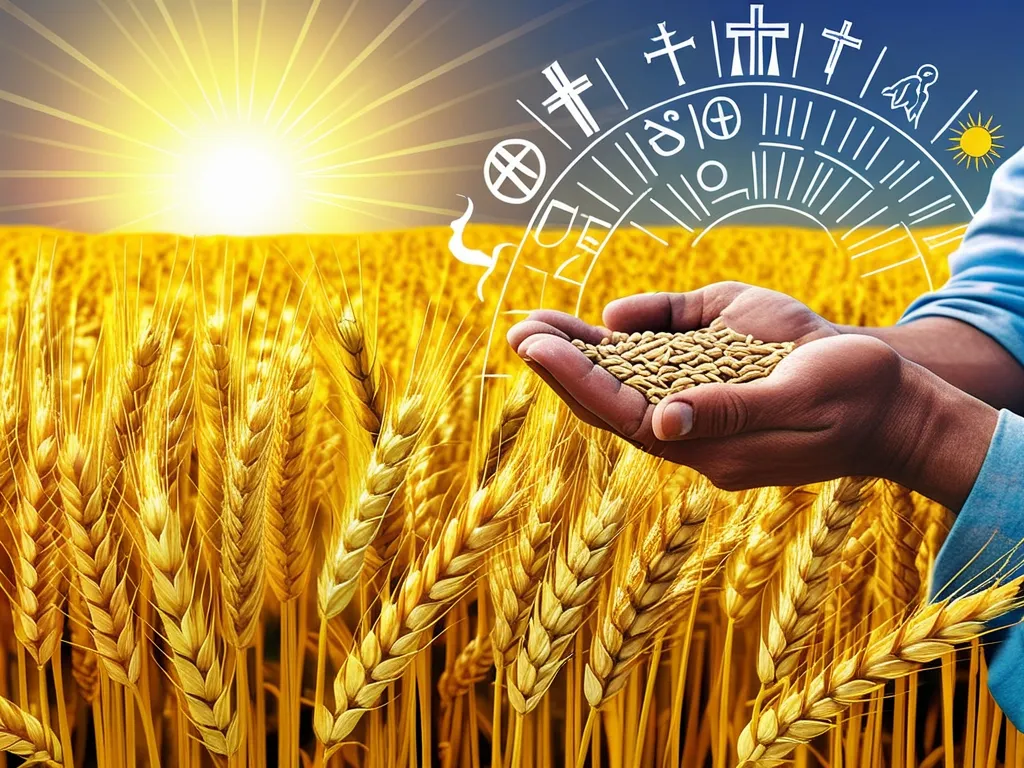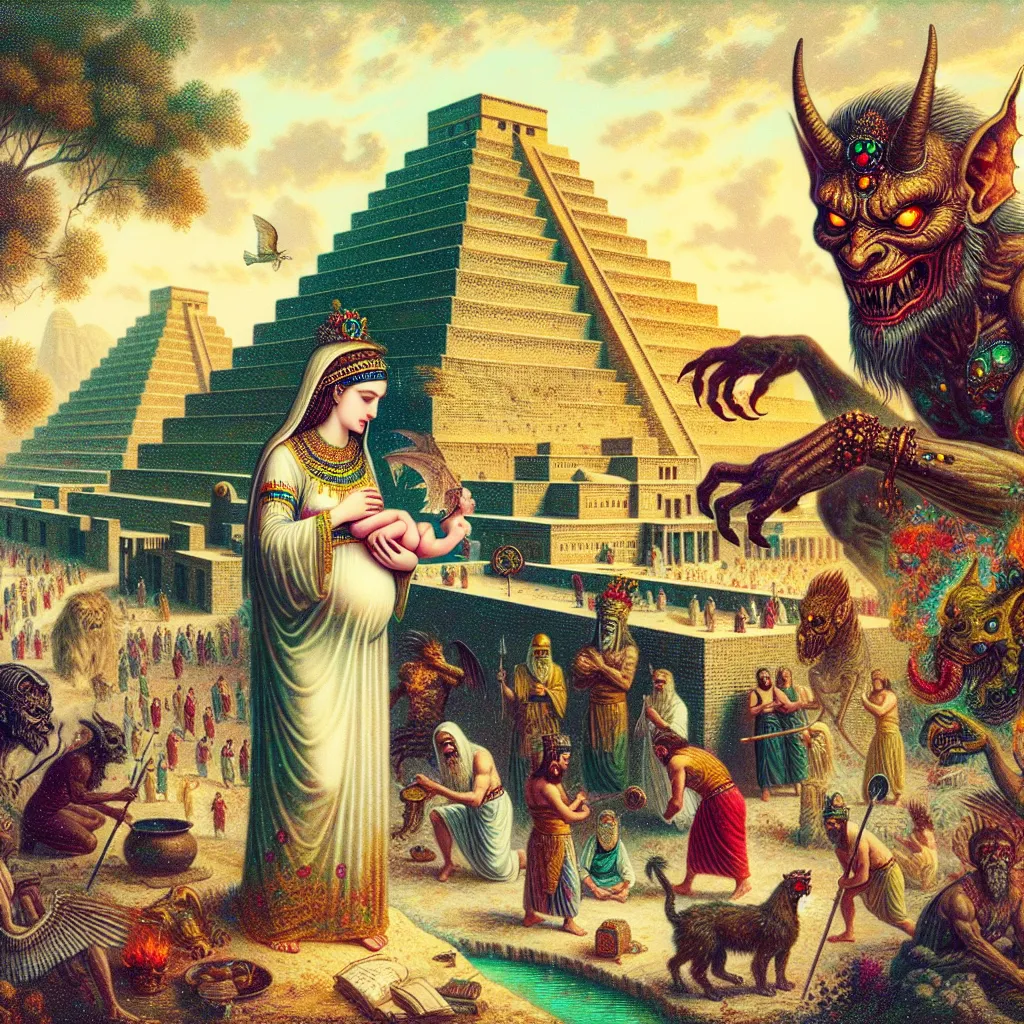As I delve into the world of agriculture, I am struck by the often-overlooked yet profound influence of religion on how we grow, cultivate, and consume food. This intersection of faith and farming is a rich tapestry that spans centuries, cultures, and continents, shaping not just our agricultural practices but also our food policies and the very way we think about the earth and its resources.
The Divine Roots of Agriculture
Agriculture itself has roots deeply embedded in religious and spiritual beliefs. The Neolithic Revolution, which marked the beginning of farming around 12,000 years ago in the Fertile Crescent, was not just a practical innovation but also a spiritual one. Women in preagrarian societies were often the pioneers in collecting and cultivating wild plants, a practice that was both a survival strategy and a sacred act. In many ancient cultures, goddesses like Isis in Egypt and Demeter in Greek mythology were revered as patrons of agriculture, teaching people how to produce their own food and ensuring fertility and abundance.
Serving God Through Stewardship
For many farmers, particularly those from Christian backgrounds, their work is not just a job but a form of worship. They see themselves as servants of God, tasked with using the earth’s resources in a way that honors their Creator. This perspective is rooted in biblical teachings that emphasize the importance of stewardship and sustainability. For instance, the command to let fields rest every seven years, as mentioned in Leviticus, is a clear example of how religious law can guide sustainable agricultural practices. This approach ensures the long-term health of the land, preventing overexploitation and maintaining its fertility for future generations.
Rituals and Sacrifices
Religious rituals have long been intertwined with agricultural cycles. The offering of first fruits, a practice found in many cultures, is a prime example. Before the harvest can be consumed, a portion is presented to the deity, acknowledging the divine source of the food and ensuring the continued fertility of the earth. This ritual not only sanctifies the harvest but also serves as a form of thanksgiving, recognizing the divine hand in the cycle of growth and abundance.
In some African cultures, traditional religious specialists conduct rituals throughout the year to promote agriculture. These rituals often involve appeasing supernatural spirits to prevent droughts, poor harvests, and famines. The Aghem people of Cameroon, for example, believe that such natural calamities are signs of the gods’ displeasure and perform rituals to restore balance and fertility to the land.
Ethical Food Production
Modern-day religious communities continue to play a significant role in advocating for ethical food production. Christian missionaries, for instance, have been instrumental in introducing sustainable agricultural practices in various parts of the world. In the Bamenda Grassfields of Cameroon, both Traditional Religion and Christianity have influenced agricultural development, with a focus on organic growth and consumption. Farmers who bless their seeds in church before planting them are not just performing a ritual; they are committing to a lifestyle that respects the land and its resources.
Feasts and Fasts
Religious feasts and fasts have also shaped agricultural cycles and food consumption patterns. In Jewish tradition, the Sabbath year (Shmita) is a time when the land is allowed to rest, mirroring the biblical command. This practice not only ensures the land’s fertility but also serves as a reminder of the community’s dependence on God’s provision.
Similarly, in Hinduism, the goddess Annapurna is revered as the provider of grains and nutrition. The festival of Makar Sankranti, which marks the beginning of the harvest season, is a celebration of the divine gift of food. Such festivals often coincide with the planting and harvesting seasons, reinforcing the spiritual connection between the land, the community, and the divine.
Local Economies and Food Security
The influence of religion on agriculture extends to local economies and food security policies. In many rural communities, religious institutions are at the forefront of initiatives aimed at promoting sustainable agriculture and ensuring food security. For example, in some parts of Africa, churches and mosques have launched programs to educate farmers about best practices, provide seeds and tools, and support local markets. These initiatives not only improve agricultural productivity but also enhance community resilience and food security.
Personal Reflections
As I reflect on my own experiences with food and faith, I am reminded of the simple yet profound ways in which spirituality shapes our relationship with the earth. Growing up, I watched my grandmother prepare meals for our family gatherings, each dish infused with a sense of gratitude and reverence. She would often say a silent prayer before cooking, acknowledging the hands that had worked to bring the food to our table. This small act was a reminder that food is not just sustenance but a gift from God, to be respected and shared.
A Global Perspective
The interplay between religion and agriculture is a global phenomenon, with diverse cultures contributing their unique perspectives. In India, the Hindu concept of “Ahimsa” (non-violence) influences farming practices, with many farmers adopting organic and cruelty-free methods. In Islamic tradition, the concept of “Zakat” (charity) includes the obligation to share a portion of one’s harvest with the needy, ensuring that food is distributed equitably.
Conclusion
The relationship between religion and agriculture is a complex and multifaceted one, filled with stories of faith, stewardship, and community. As we navigate the challenges of modern agriculture—climate change, food security, and sustainability—it is crucial to recognize the role that religious beliefs and practices have played and continue to play. By embracing this spiritual dimension, we can foster a deeper respect for the land, our communities, and the divine forces that shape our world.
In the end, the act of producing and consuming food is not just a mundane task but a sacred ritual that connects us to our past, our present, and our future. As we sit down to our meals, let us remember the hands that have worked to bring us this food, the land that has nurtured it, and the divine hand that guides it all. For in this simple act of eating, we are part of a much larger story—one of faith, stewardship, and the eternal cycle of life.






